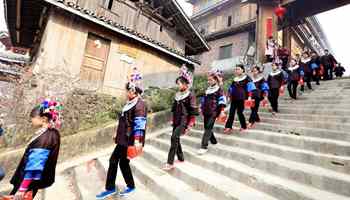CHENGDU, Jan. 31 (Xinhua) -- Wang Wenxiang, 42, has never experienced such a festive New Year before.
The little mountainous region he inhabits in southwest China's Sichuan Province used to be cut off from the outside world by a wide river.
The river did not really stop anyone from leaving home, but it was a major obstacle to coming back. Relatives living elsewhere who had been away for years finally made their way back to Jianmei township in Yi Autonomous Prefecture this year, across a new bridge over the Yalong River. The previous alternative was a dangerous trip along a zipline over the seething waters.
Sichuan has spent more than 1.2 billion yuan (175 million U.S. dollars) replacing ziplines in the province with 74 bridges. Three more will be completed soon. Sichuan's zipline-to-bridge projects are expected to benefit 120,000 people in 500 villages.
"As children, we had to get to the other side by boat. Later came the zipline," said Wang. "Without a bridge, it was still no easy matter to come in or go out. Some elderly people have never been across the river."
Just after the bridge opened in August, many former residents returned to celebrate. "It used to take two days to walk to the nearest market," Wang recalled.
The bridge has liberated a local economy once suffocated by poor transportation.
"Before, we relied on horses to carry goods. You would never see farmers taking fresh peppers, nuts, fruit or meat to market because they may rot on the way," said Gao Debin, the Communist Party of China chief of Jianmei. Today, people drive up to the villagers' doorsteps to buy produce, Wang said.
Honghua Village in Cangxi County has started supplying traditional Chinese medicine ingredients since its bridge opened last year.
In Butuo County, construction of a bridge over the Jinsha River, the upper stream of the Yangtze River will resume after the Spring Festival holiday.
"Nearly 50,000 people are counting on the bridge. We will try our best to finish it before the next Spring Festival," said commander Yang Chaofu.
Workers toiled for more than 10 hours on over 320 days last year, but the task remains daunting because of the mountainous terrain and bad weather, according to Yang.
Transportation infrastructure is a crucial aspect of China's long-term poverty alleviation campaign, which aims to eradicate poverty by 2020. China still has tens of millions of poor people in rural areas.














